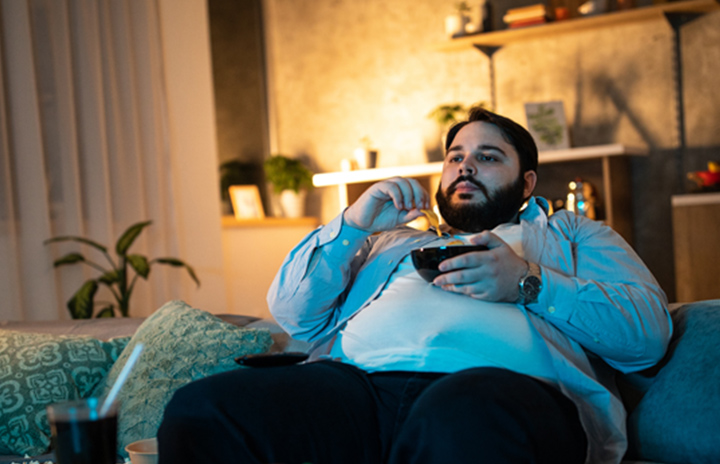
Obesity through the lens
Obesity affects many people world wide and hearing other peoples stories can be helpful. Find personal narratives of how other people live with obesity.
You may be one of the several million people who have been forced to stay at home in isolation or quarantine due to the outbreak of the coronavirus (COVID-19). Social distancing and interruption to our everyday routines is a challenge for everyone, but if you live with obesity, you may experience the challenging times of living under a world-level threat especially difficult regarding weight management.
In order to make life just a little bit easier and help you cope with the situation, we asked Dr. Michael Vallis (MV hereafter), a health psychologist and Associate Professor of Family Medicine at Dalhousie University, Canada to explain some of the emotional reactions that people are having to the coronavirus pandemic and what the healthy ways to cope with the situation are.
"If you are feeling nervous or fearful, that makes you normal."
This is general disease awareness information and should not be understood as medical advice. If you experience symptoms of COVID-19 or have questions, doubts or concerns, you should contact your doctor and always follow the advice of local authorities.
MV: It is generally the case that fear grows in the dark. What do I mean by this? The natural reaction to the perception of threat, uncertainty and “what if…” thinking is a host of feelings: anxiety, worry, fear and panic. COVID-19 brings with it extreme threat and uncertainty. So, if you are feeling nervous or fearful, that makes you normal. But it also puts you in the position of needing to manage your feelings. Low to moderate levels of anxiety can kick you into gear, but very high levels can overwhelm or paralyse you.
The most natural response to fear is escape – to get away from the fear. This worked well for us in primitive times when we could escape a predator. How do we get away from a stress that we cannot escape, like COVID-19? Isolation can help you avoid the virus itself but not the fear of the virus. We go into survival mode and we do what works. It turns out that for most of us, food is calming and positive or distracting and numbing. Ask yourself: Are you likely to turn to food when stressed? If so, would you be interested in coping strategies that can help you manage stress and manage the stress-eating connection?

"It turns out that for most of us, food is calming and positive or distracting and numbing."
Because food is experienced as pleasure, stress eating (and eating when bored) is really a way of coping. Although not healthy, it makes sense from a coping perspective. I encourage you to see food as serving a function in this situation. My invitation to you is to ask yourself: How can I replace the function of food as a stress manager?
MV: Understanding is an important first step in coping, yes, but it is only a first step. So now let’s talk about the next steps of coping. Coping involves several steps:
This is just for disease awareness purpose, Please talk to your doctor or HCP if you have any questions and follow their advice.
Fear is normal when there is a threat. Humans are emotional beings and we will feel both positive and negative emotions, based on our experience. Threat results in fear, the perception of loss results in sadness (or depression) and the experience of intrusion results in anger.
Coping with these normal feelings is generally associated with emotional expression and social support. That is, when we are feeling worried and anxious, we do not have to suppress these feelings. Finding ways of expressing our feelings (such as talking, writing, singing or dancing) can help us discharge our feelings. Emotions are like waves; they come on and if we allow them, they pass. Trying to ignore or suppress our normal feelings can make things worse.
"Ask yourself: How can I replace the function of food as a stress manager?"
Here is where the concept of replacing food as a stress manager comes into play. If you find yourself eating in reaction to fear, anxiety or boredom, would you consider practicing coping strategies other than eating? The good news here is that there are many alternative strategies that could be helpful. The bad news is that any coping strategy needs to be learned and will not work right away. We recommend that people practice any coping strategy many times, say 20 or 25 times, before deciding if that strategy is helpful. I can summarise general coping strategies into five categories :

"Emotions are like waves; they come on and if we allow them, they pass."
COVID-19 has changed our physical world. For many of us things have changed significantly and very quickly. We have more unstructured time and we are closer to our kitchens than usual. We may benefit by figuring out how to keep a distance from our food, especially the foods that we might turn to for reasons other than hunger.
If you have a daily meal plan (say, 3 meals and 1 or 2 snacks) it will be healthy to stay on the plan. Here are some ways to control your eating:
If you have any further questions regarding COVID-19, please visit the World Health Organization and your local health authorities websites.
HQ23OB00067
Talk to your weight management provider about treatment options that could prevent the weight you lose from coming back.
The following directory is provided based on your geographical location and is not an attempt by Novo Nordisk to specifically promote any of the weight management providers. Please feel free to consult your own qualified healthcare provider if available.


